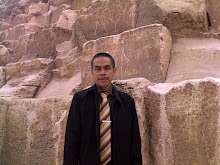TERRORISM, GLOBALIZATION, AND MORAL VALUES
Abd A‘la
Terrorism and other similar actions have been bringing our world and life into chaos and disorder. The number of innocent victims has been innumerable. Even though, this inhuman action is still very possible to happen again in the future. The perpetrators of this barbaric action seem to continue their deadly actions.
To overcome this savage violence of terrorism, so far we have been trapped in reactive actions. Like someone distraught, we have appeared to act foolhardy against it. We were not able to offer a systematic wise critical solution other than mere declaring war against those terrorizing actions. At the same time, we tended to ignore the root of the problem. As long as our action spins around that, the terrorism, barbarism and the like will never disappear from our life.
Globalization
Though it can be debatable, one of the roots of spreading of terrorism and barbaric action in our contemporary world interacts to the contemporary unjust world order. At the global level, a few rich countries in the North not only have dominated source of natural wealth of the poorest countries in the South, but also the lives of their communities. Not enough with that, they to a certain degree also have lived in hypocrisy as well.
This domination has become stronger in this globalization era, from when the some developed countries in the Western World –as Sindhunata expressed (Basis 01-02, 2003) –, expanded their view of life that undermines those who are weak.
Such globalization has made many communities in the
In such conditions, they tried to find refuge, which in their view could provide a strong spirit to fight against the threat. On this side, they found religious symbols, which they freed from its moral values and universal meaning. They exploited the symbols to justify merely their frustration and to develop an ideology against the West from which they were of opinion that life is not more than a fight of power. Ironically, the power they owned is only to do violence and terrorism, or to spread outrage.
The impact then is the world becomes the massacre, both allegorically which the some western country have done, and literally developed by the terrorists.
Strengthening Moral Values
On the concept level, no any religion that teaches violence, especially in the form of terrorizing murder. Accurate research on the background of terrorism and alike spreading at this time finds that the violence action is no basic theological preferences. The religion was made only as justification to support their brutal actions.
They performed their actions was more triggered by conditions not conducive for the life such as poverty, inequality and the like that from time to time have become widen. This issues –not the religion issue –we need to discuss seriously. Therefore, we have to develop humane dialogue and a policy paying fully attention on the fate of majority of the oppressed people and the general public interests.
It does not mean that inter-religious dialogue is not important. We must deal with this dialogue, but it must be directed to anchor values of universal morality in public areas. In line with that, we need to develop the dialogue of civilization emphasizing on landing the values of civility and working out of a new world order being able to achieve social equality and solidarity amongst world communities.
To reach this agenda, we need to eliminate the greed and hubris that still shackle most of our attitude and behaviors. We must be ready to share with most people at the grassroots who truly marginalized from various aspects –education, economic and political ones. Indifference to their situation is not impossible to become a boomerang taking birth for perpetual terrorism©.








